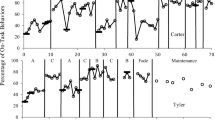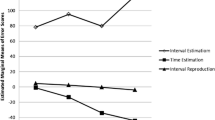Abstract
Previous studies have shown that instantaneous time sampling results are more highly correlated with true duration than are one-zero sampling results. One-zero results, however, reflected a composite of both duration and frequency better than did instantaneous results. It is shown in this analysis that these outcomes are the logical result of the definitions of the two sampling modes. When interval lengths meet specific requirements, correct frequency counts can be obtained with either mode and systematic duration error with one-zero sampling can be eliminated by subtracting frequency from the number of intervals scored ‘one.’
Similar content being viewed by others
References
Altmann, J., 1974. Observational study of behavior: Sampling methods.Behaviour, 49: 227–267.
Ary, D., in press. Mathematical prediction of sampling component of behavior observation measurement error.Behav. Assessment.
Dunbar, R., 1976. Some aspects of research design and their implications in the observational study of behavior.Behaviour, 58: 79–98.
Goodenough, F. L., 1928. Measuring behavior traits by means of repeated short samples.J. Juv. Res., 12: 230–235.
Green, S. B. &L. G. Alverson, 1978. A comparison of indirect measures for long-duration behaviors.J. Appl. Behav. Analys., 11: 530.
Hinde, R. A. &Y. Spencer-Booth, 1967. The behaviour of socially-living rhesus monkeys in their first two and one-half years.Anim. Behav., 15: 169–196.
Leger, D., 1977. An empirical evaluation of instantaneous and one-zero sampling of chimpanzee behavior.Primates, 18: 387–393.
McDowell, E., 1973. Comparison of time-sampling and continuous recording techniques for observing developmental changes in caretaker and infant behaviors.J. Genet. Psychol., 123: 99–105.
Milar, C. &R. Hawkins, 1976. Distorted results from the use of interval recording techniques. In:Behaviour Analysis in Education: Self-control and Reading,T. Bringham,R. Hawkins,J. Scott &T. McLaughlin (eds.), Kendall/Hunt, Dubuque, Iowa, pp. 261–273.
Murphy, G. &E. Goodall, 1980. Measurement error in direct observations: A comparison of common recording methods.Behav. Res. & Therap., 18: 147–150.
Powell, J., A. Martindale &S. Kulp, 1975. An evaluation of time-sample measure of behavior.J. Appl. Behav. Analys., 8: 463–469.
————,D. Martindale, S. Kulp, A. Martindale &R. Bauman, 1977. Taking a closer look: Time sampling and measurement error.J. Appl. Behav. Analys., 10: 325–332.
———— &R. Rockinson, 1978. On the inability of interval time sampling to reflect frequency of occurrence data.J. Appl. Behav. Analys., 11: 531–532.
Rhine, R. J. &A. Linville, 1980. Properties of one-zero scores in observational studies of primate social behavior: The effect of assumptions on empirical analysis.Primates, 21: 111–122.
Sanson-Fisher, R., A. Poole &J. Dunn, 1980. An empirical method for determining an appropriate interval length for recording behavior.J. Appl. Behav. Analys., 13: 493–500.
Simpson, M. J. A. &A. E. Simpson, 1977. One-zero and scan-methods for sampling behavior.Anim. Behav., 25: 726–731.
Suomi, S. J. &H. F. Harlow, 1972. Social rehabilitation of isolate-reared monkeys.Develop. Psychol., 6: 487–496.
Author information
Authors and Affiliations
About this article
Cite this article
Suen, H.K., Ary, D. Variables influencing one-zero and instantaneous time sampling outcomes. Primates 25, 89–94 (1984). https://doi.org/10.1007/BF02382298
Received:
Accepted:
Issue Date:
DOI: https://doi.org/10.1007/BF02382298




